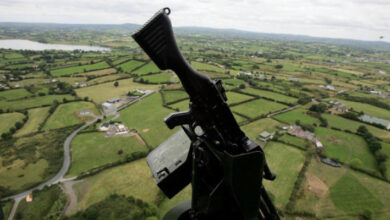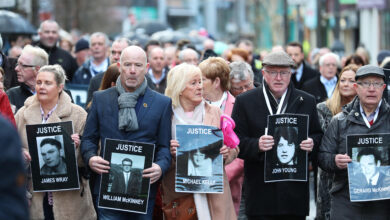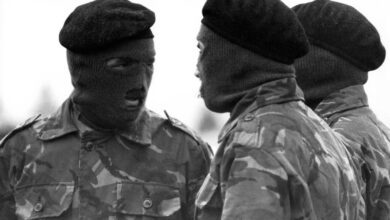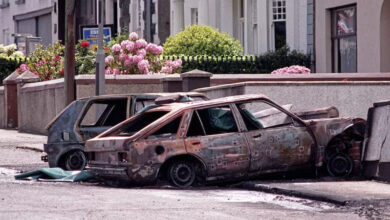La morte di Gusty Spence, fondatore della Ulster Volunteer Force
Ex-UVF chief Spence dies
Former Ulster Volunteer Force leader Gusty Spence has died in hospital aged 78.
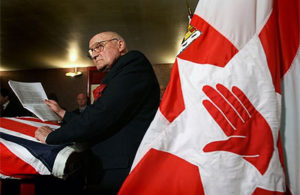 Spence was a feared killer in the 1960s but later renounced violence and announced the 1994 Combined Loyalist Military Command ceasefire.
Spence was a feared killer in the 1960s but later renounced violence and announced the 1994 Combined Loyalist Military Command ceasefire.
He served 18 years for murder after his gang shot dead a Catholic teenager and wounded two others as they left a pub on Malvern Street, Belfast, in 1966 as the Troubles were about to ignite.
Mr Spence became heavily involved in politics and was a key figure in the Progressive Unionist Party, alongside figures like the late David Ervine.
In May 2007, he read out the statement by the UVF announcing that it would keep its weapons but put them beyond the reach of ordinary members.
UTV’s Political Editor Ken Reid described Gusty Spence as “a considerable figure in loyalist paramilitarism”.
“He really was the person who brought forward the PUP which attempted to move the UVF from violence into politics and that party did, for a short period, enjoy a degree of success.
“Gusty Spence delivered the loyalist ceasefire statement in 1994, where he talked about the true and abject remorse for what had happened.
“I went to visit Gusty Spence in Groomsport in the last year and he was certainly very upset about the murder of Bobby Moffett on the Shankill Road and, interestingly, he told me that he always believed there would come a time when the PUP and the UVF would have to go their separate ways.”
Gusty Spence was a paramilitary godfather and one of the founding figures of the UVF, but was also among the first to recognise the need for peace.
He was a former military policeman from the Shankill Road in Belfast. His father was a member of the original Ulster Volunteer Force, originally formed to defend Ulster against the danger of Home Rule, but which then lost thousands of men on the battlefield of the Somme.
The UVF was stood down at the end of the First World War, but Spence helped re-invent it in 1966 when the UVF declared war on the IRA.
It was ordinary Catholics who were soon being targeted.
In June 1966, John Scullion, a Catholic aged 28, became the first victim of the Troubles when he was shot by the UVF in the Falls Road area, and died two weeks later.
Spence was one of three men charged with the murder but the charges were dropped.
Later that month, Spence and a number of other UVF members were in the Malvern Arms pub in the Shankill Road area when four Catholic barmen arrived for a post-work drink.
Spence overheard their conversation and identified them as Catholics and they were ambushed as they left. Peter Ward, 18, was shot dead.
Spence was found guilty of the murder and sentenced to life in prison but escaped in July 1972 after being given six hours parole to attend his daughter’s wedding.
Days later he gave a television interview as the organisation’s commanding officer.
He was on-the-run for four months, during which time he re-organised the UVF, before he was arrested and sent back to prison, where he remained until December 1984.
It was during his time in the UVF compounds in the high-security Maze prison that Spence began to seriously consider politics and he urged several figures who were to become integral to the UVF’s peace strategy to do the same.
The late David Ervine, who played a central role in persuading the UVF to declare its ceasefire in October 1994 and became the public voice of the armed group as leader of the Progressive Unionist Party, was one of those swayed by prison politics. He was to become a passionate supporter of the peace process.
After his release from prison in December 1984 because of poor health, Spence was a key figure in developing political thinking within the UVF.
In October 1994 he announced that the main loyalist paramilitary groups, the UVF and the Ulster Defence Association, were declaring ceasefires.
Spence offered his “abject and true remorse” to the loved ones of all the innocent victims of the Troubles.
He has kept a low profile and been ill in recent years, but made the UVF statement in 2007 that weapons had been put beyond use.
Gusty Spence remembered
Loyalist ceasefire announcement

